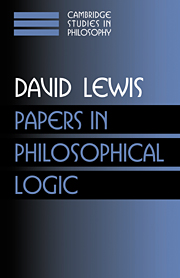Book contents
- Frontmatter
- Contents
- Dedication
- Introduction
- 1 Adverbs of quantification
- 2 Index, context, and content
- 3 ‘Whether’ report
- 4 Probabilities of conditionals and conditional probabilities II
- 5 Intensional logics without iterative axioms
- 6 Ordering semantics and premise semantics for counterfactuals
- 7 Logic for equivocators
- 8 Relevant implication
- 9 Statements partly about observation
- 10 Ayer's first empiricist criterion of meaning: why does it fail?
- 11 Analog and digital
- 12 Lucas against mechanism
- 13 Lucas against mechanism II
- 14 Policing the Aufbau
- 15 Finitude and infinitude in the atomic calculus of individuals (with Wilfrid Hodges)
- 16 Nominalistic set theory
- 17 Mathematics is megethology
- Index
8 - Relevant implication
Published online by Cambridge University Press: 05 June 2012
- Frontmatter
- Contents
- Dedication
- Introduction
- 1 Adverbs of quantification
- 2 Index, context, and content
- 3 ‘Whether’ report
- 4 Probabilities of conditionals and conditional probabilities II
- 5 Intensional logics without iterative axioms
- 6 Ordering semantics and premise semantics for counterfactuals
- 7 Logic for equivocators
- 8 Relevant implication
- 9 Statements partly about observation
- 10 Ayer's first empiricist criterion of meaning: why does it fail?
- 11 Analog and digital
- 12 Lucas against mechanism
- 13 Lucas against mechanism II
- 14 Policing the Aufbau
- 15 Finitude and infinitude in the atomic calculus of individuals (with Wilfrid Hodges)
- 16 Nominalistic set theory
- 17 Mathematics is megethology
- Index
Summary
In [4] I offered an analysis of what it means to be (entirely) about a subject matter. I first repeat that analysis. Then I define several relations of relevance, for instance, between the premise and conclusion of an implication. I show that whenever a premise implies a conclusion, in the ordinary sense of truth-preservation, then also the premise is relevant to the conclusion in the sense of the present analysis. Pace Anderson and Belnap [1], there can be no such thing as a truth-preserving “fallacy of relevance”. Finally I remark that this does not by any means do away with all motivations for relevant logic.
SUBJECT MATTERS
We can think of a subject matter, sometimes, as a part of the world: the 17th Century is a subject matter, and also a part of this world. Or better, we can think of a subject matter as a part of the world in intension: a function which picks out, for any given world, the appropriate part – as it might be, that world's 17th Century. (If for some reason the world had no 17th Century, the function would be undefined.) We can say that two worlds are exactly alike with respect to a given subject matter. For instance two worlds are alike with respect to the 17th Century iff their 17th Centuries are exact intrinsic duplicates (or if neither one has a 17th Century).
This being exactly alike is an equivalence relation.
- Type
- Chapter
- Information
- Papers in Philosophical Logic , pp. 111 - 124Publisher: Cambridge University PressPrint publication year: 1997
- 1
- Cited by

